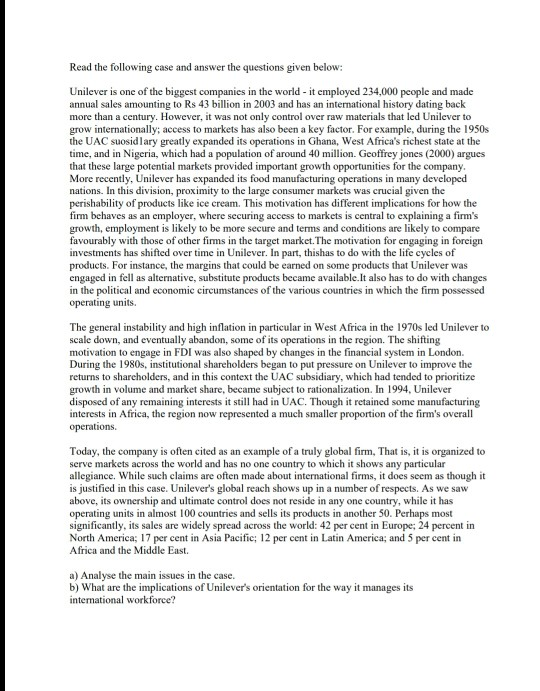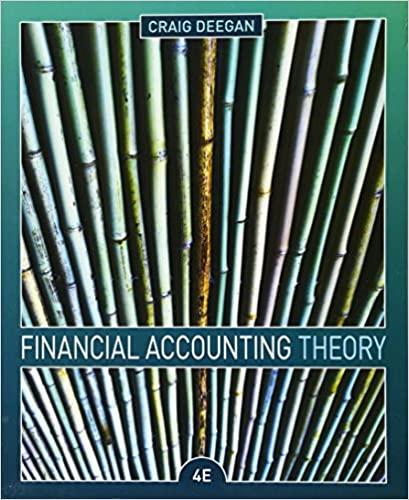Question
Read the following case and answer the questions given below: Unilever is one of the biggest companies in the world - it employed 234,000 people
Read the following case and answer the questions given below: Unilever is one of the biggest companies in the world - it employed 234,000 people and made annual sales amounting to Rs 43 billion in 2003 and has an international history dating back more than a century. However, it was not only control over raw materials that led Unilever to grow internationally; access to markets has also been a key factor. For example, during the 1950s the UAC suosid1ary greatly expanded its operations in Ghana, West Africa's richest state at the time, and in Nigeria, which had a population of around 40 million. Geoffrey jones (2000) argues that these large potential markets provided important growth opportunities for the company. More recently, Unilever has expanded its food manufacturing operations in many developed nations. In this division, proximity to the large consumer markets was crucial given the perishability of products like ice cream. This motivation has different implications for how the firm behaves as an employer, where securing access to markets is central to explaining a firm's growth, employment is likely to be more secure and terms and conditions are likely to compare favourably with those of other firms in the target market.The motivation for engaging in foreign investments has shifted over time in Unilever. In part, thishas to do with the life cycles of products. For instance, the margins that could be earned on some products that Unilever was engaged in fell as alternative, substitute products became available.It also has to do with changes in the political and economic circumstances of the various countries in which the firm possessed operating units. The general instability and high inflation in particular in West Africa in the 1970s led Unilever to scale down, and eventually abandon, some of its operations in the region. The shifting motivation to engage in FDI was also shaped by changes in the financial system in London. During the 1980s, institutional shareholders began to put pressure on Unilever to improve the returns to shareholders, and in this context the UAC subsidiary, which had tended to prioritize growth in volume and market share, became subject to rationalization. In 1994, Unilever disposed of any remaining interests it still had in UAC. Though it retained some manufacturing interests in Africa, the region now represented a much smaller proportion of the firm's overall operations. Today, the company is often cited as an example of a truly global firm, That is, it is organized to serve markets across the world and has no one country to which it shows any particular allegiance. While such claims are often made about international firms, it does seem as though it is justified in this case. Unilever's global reach shows up in a number of respects. As we saw above, its ownership and ultimate control does not reside in any one country, while it has operating units in almost 100 countries and sells its products in another 50. Perhaps most significantly, its sales are widely spread across the world: 42 per cent in Europe; 24 percent in North America; 17 per cent in Asia Pacific; 12 per cent in Latin America; and 5 per cent in Africa and the Middle East. a) Analyse the main issues in the case. b) What are the implications of Unilever's orientation for the way it manages its international workforce?

Read the following case and answer the questions given below: Unilever is one of the biggest companies in the world - it employed 234,000 people and made annual sales amounting to Rs 43 billion in 2003 and has an international history dating back more than a century. However, it was not only control over raw materials that led Unilever to grow internationally, access to markets has also been a key factor. For example, during the 1950s the UAC suosidlary greatly expanded its operations in Ghana, West Africa's richest state at the time, and in Nigeria, which had a population of around 40 million. Geoffrey jones (2000) argues that these large potential markets provided important growth opportunities for the company, More recently, Unilever has expanded its food manufacturing operations in many developed nations. In this division, proximity to the large consumer markets was crucial given the perishability of products like ice cream. This motivation has different implications for how the firm behaves as an employer, where securing access to markets is central to explaining a firm's growth, employment is likely to be more secure and terms and conditions are likely to compare favourably with those of other firms in the target market. The motivation for engaging in foreign investments has shifted over time in Unilever. In part, thishas to do with the life cycles of products. For instance, the margins that could be earned on some products that Unilever was engaged in fell as alternative, substitute products became available.It also has to do with changes in the political and economic circumstances of the various countries in which the firm possessed operating units. The general instability and high inflation in particular in West Africa in the 1970s led Unilever to scale down, and eventually abandon, some of its operations in the region. The shifting motivation to engage in FDI was also shaped by changes in the financial system in London. During the 1980s, institutional shareholders began to put pressure on Unilever to improve the returns to shareholders, and in this context the UAC subsidiary, which had tended to prioritize growth in volume and market share, became subject to rationalization. In 1994, Unilever disposed of any remaining interests it still had in UAC. Though it retained some manufacturing interests in Africa, the region now represented a much smaller proportion of the firm's overall operations. Today, the company is often cited as an example of a truly global firm, That is, it is organized to serve markets across the world and has no one country to which it shows any particular allegiance. While such claims are often made about international firms, it does seem as though it is justified in this case. Unilever's global reach shows up in a number of respects. As we saw above, its ownership and ultimate control does not reside in any one country, while it has operating units in almost 100 countries and sells its products in another 50. Perhaps most significantly, its sales are widely spread across the world: 42 per cent in Europe; 24 percent in North America; 17 per cent in Asia Pacific; 12 per cent in Latin America; and 5 per cent in Africa and the Middle East. a) Analyse the main issues in the case. b) What are the implications of Unilever's orientation for the way it manages its international workforce? Read the following case and answer the questions given below: Unilever is one of the biggest companies in the world - it employed 234,000 people and made annual sales amounting to Rs 43 billion in 2003 and has an international history dating back more than a century. However, it was not only control over raw materials that led Unilever to grow internationally, access to markets has also been a key factor. For example, during the 1950s the UAC suosidlary greatly expanded its operations in Ghana, West Africa's richest state at the time, and in Nigeria, which had a population of around 40 million. Geoffrey jones (2000) argues that these large potential markets provided important growth opportunities for the company, More recently, Unilever has expanded its food manufacturing operations in many developed nations. In this division, proximity to the large consumer markets was crucial given the perishability of products like ice cream. This motivation has different implications for how the firm behaves as an employer, where securing access to markets is central to explaining a firm's growth, employment is likely to be more secure and terms and conditions are likely to compare favourably with those of other firms in the target market. The motivation for engaging in foreign investments has shifted over time in Unilever. In part, thishas to do with the life cycles of products. For instance, the margins that could be earned on some products that Unilever was engaged in fell as alternative, substitute products became available.It also has to do with changes in the political and economic circumstances of the various countries in which the firm possessed operating units. The general instability and high inflation in particular in West Africa in the 1970s led Unilever to scale down, and eventually abandon, some of its operations in the region. The shifting motivation to engage in FDI was also shaped by changes in the financial system in London. During the 1980s, institutional shareholders began to put pressure on Unilever to improve the returns to shareholders, and in this context the UAC subsidiary, which had tended to prioritize growth in volume and market share, became subject to rationalization. In 1994, Unilever disposed of any remaining interests it still had in UAC. Though it retained some manufacturing interests in Africa, the region now represented a much smaller proportion of the firm's overall operations. Today, the company is often cited as an example of a truly global firm, That is, it is organized to serve markets across the world and has no one country to which it shows any particular allegiance. While such claims are often made about international firms, it does seem as though it is justified in this case. Unilever's global reach shows up in a number of respects. As we saw above, its ownership and ultimate control does not reside in any one country, while it has operating units in almost 100 countries and sells its products in another 50. Perhaps most significantly, its sales are widely spread across the world: 42 per cent in Europe; 24 percent in North America; 17 per cent in Asia Pacific; 12 per cent in Latin America; and 5 per cent in Africa and the Middle East. a) Analyse the main issues in the case. b) What are the implications of Unilever's orientation for the way it manages its international workforce
Step by Step Solution
There are 3 Steps involved in it
Step: 1

Get Instant Access to Expert-Tailored Solutions
See step-by-step solutions with expert insights and AI powered tools for academic success
Step: 2

Step: 3

Ace Your Homework with AI
Get the answers you need in no time with our AI-driven, step-by-step assistance
Get Started


